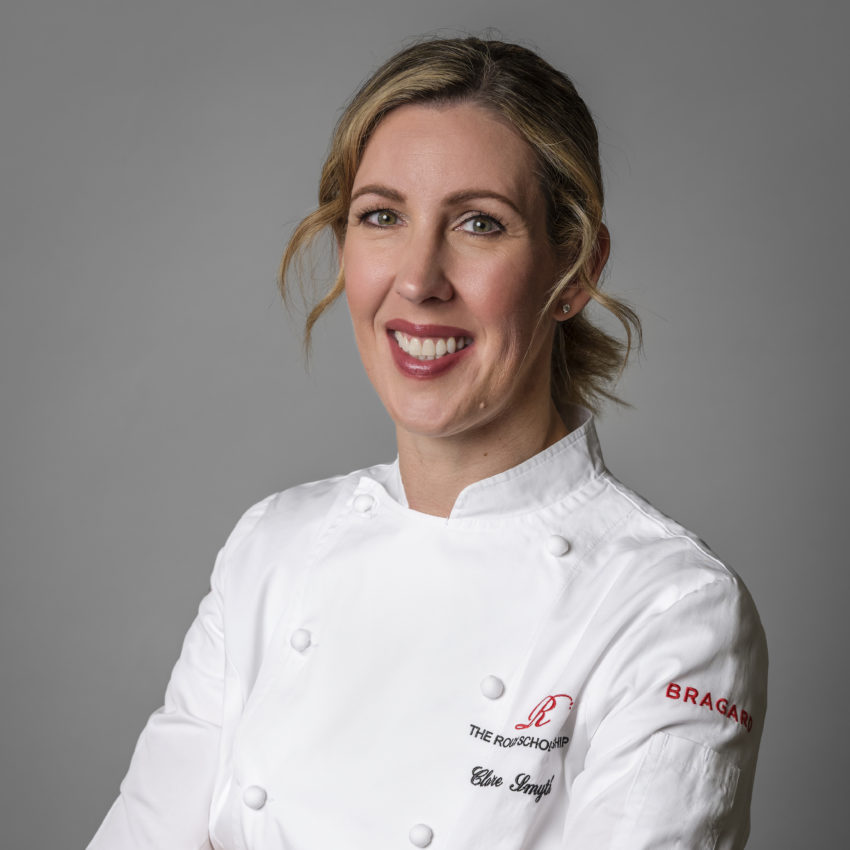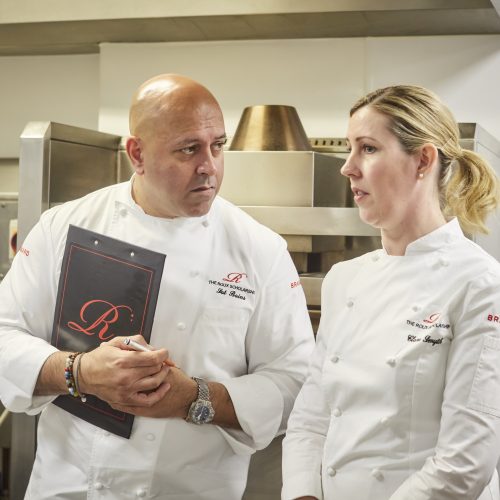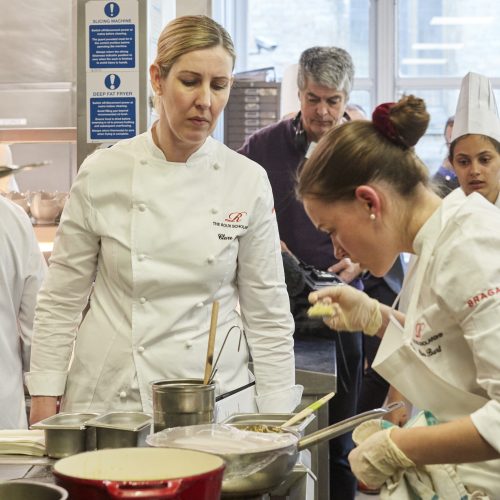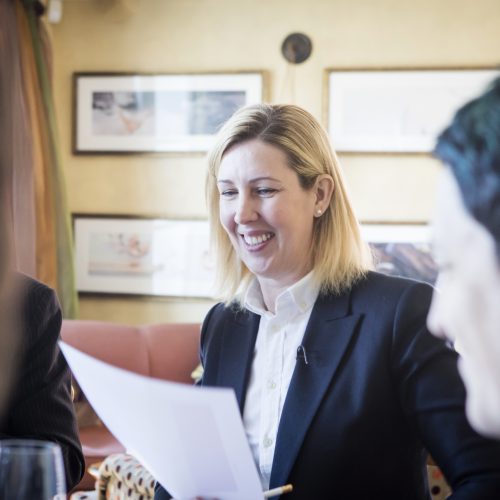
As one of Britain's best chefs, Clare Smyth brings years of experience of working in some of Europe's best restaurants to the judging panel.
Born in Northern Ireland, Clare grew up on a farm in County Antrim and was first inspired to become a chef at the age of fifteen, when she had a holiday job in a local fine dining restaurant.
She left school at sixteen to study catering at Highbury College in Portsmouth, Hampshire, during which time she served worked as an apprentice at Grayshott Hall, Surrey.
Her next role was as commis chef at Terence Conran's restaurant at Michelin House, London, after which she followed this with a six-month period in Australia to work for a catering company, returning to the UK to stage at a number of restaurants including the The Waterside Inn and Gidleigh Park. She worked at the restaurant of the St Enodoc Hotel in Rock, Cornwall, first as Sous Chef and then as Head Chef. During her time there, she won the title Young Cornish Fish Chef of the Year.
In 2002, Clare took a position at Restaurant Gordon Ramsay, after leaving for a year and a half to work with Alain Ducasse at the three-star Le Louis XV in Monte Carlo, she returned to London and the Ramsay Group in 2007 to take the position of Head Chef aged just 28, becoming the first female chef to run a three-star Michelin restaurant in the UK.
She became Chef Patron in 2012 at Restaurant Gordon Ramsay and the following year, was appointed Member of the Order of the British Empire (MBE) for services to the hospitality industry.
More success followed with The Good Food Guide awarding Clare their Chef of the Year Award 2013, as well as her team achieving a perfect 10/10 score in 2014, 2015 and 2016 – one of only three restaurants in the UK to achieve this score. In 2016, Restaurant Gordon Ramsay in Hospital Road was awarded five AA rosettes and Clare won the Cateys Chef of the Year Award 2016. In 2017, the Michelin Guide for Great Britain & NI awarded her the Michelin Female Chef award.
Following on from that success, 2018 saw Clare receive further accolades. In June 2018 at the World’s 50 Best Restaurants Awards, she collected the award for the World’s Best Female Chef. Though the award itself is controversial, many believing it unnecessary to have a gendered prize, Clare said in her acceptance speech: “There is no right and wrong way to address this, but things won’t change if we do nothing.” Earlier that month, Core was named the fourth best restaurant in the UK in the National Restaurant Awards. At the Craft Guild of Chefs Awards, Core won Best New Restaurant of the Year. 2019 was also an important year for Clare; Clare received a Doctorate for Queen’s University Belfast for her services to the hospitality industry and a few months later came the release of the 2020 Michelin Guide – Core went straight in with two stars. Just one year later, Core was awarded three Michelin stars in the 2021 guide.
Clare joined the Roux Scholarship judging panel in 2017 and believes that, having had great mentors herself, that it is important she supports and teaches the next generation of chefs, striving to move the industry forward.



How did your upbringing on a farm influence your respect for ingredients?
It gave me a deeper understanding of the hard work that goes into producing food and therefore, the respect that we must have for it. That work ethic has always stayed with me.
Who were your early influences?
I worked in a fine dining restaurant as a teenager and the head chef previously worked in a Michelin-starred restaurant. Learning about his experience, it was the first time I heard about Michelin stars and I was instantly intrigued. I bought Anton Mosimann’s ‘Cuisine a La Carte’ book and from there I was hooked. I knew that was what I wanted to do.
How did your many stages help your development as a chef?
We never stop learning as chefs that is why our job is so interesting. It is an endless subject that we study, gathering knowledge from our predecessors, developing skills and techniques, plus having an understanding of our history and how the ingredients we work with our grown. Afterwards it takes meticulous practice. The more you learn and the more you work, the better you are.
You’re known for your calmness in the kitchen, which contrasts with your mentor of many years, Gordon Ramsay. How important is it that chefs are true to themselves when leading a brigade?
Being yourself is very important. You should cook from your heart - dishes that mean something to you, that reflect who you are, where you come from, your personality, and the journey you’ve taken. We will always be influenced by others but in the end, what we create should always be personal and meaningful.
What do you enjoy about judging the Roux Scholarship?
One of the parts I enjoy most about being a judge is being around other chefs with different styles and views.
What advice would you give applicants?
It’s important to take your time with your application form, giving the writing up the same attention as creating the dish. Because of this, good people miss out. With your entry, make it sound delicious; provide a neat recipe with correct, precise measurements and finally - a good photo goes a long way.
How can taking part in The Roux Scholarship help a chef's career?
Taking part in the Roux Scholarship helps raise a chef’s profile and gets his or her name out there. The experience also provides a real learning process which itself is extremely valuable.
How do employers/kitchen brigades benefit from entering their chefs?
Entering the competition is great for training purposes and the whole team can get behind it. It can be as much about learning and pushing yourself. But the team can also learn and get behind the process.
Why is it important to learn and master the classic cooking techniques?
The Classics are the foundation of our craft like any other profession. We have to master the techniques, skills and knowledge in order to be a good chef.
What have YOU learned thanks to being a judge?
I love judging. I always learn new things from either my fellow judges or the contestants and see such wide-ranging styles. I have a deep respect for the Scholarship and enjoy taking part.
